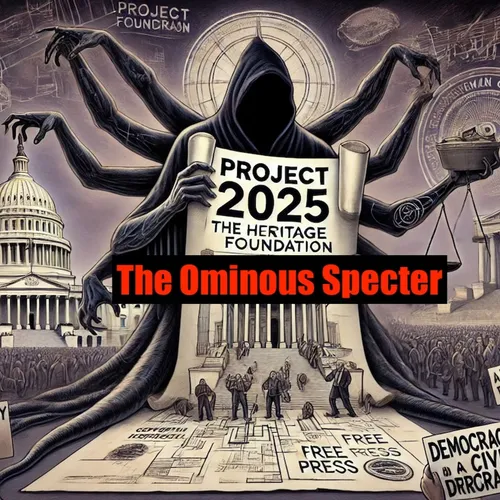"Shaping the Next Republican Presidency: The Ambitious Goals of Project 2025"
- Author
- Quiet.Please
- Published
- Tue 04 Feb 2025
- Episode Link
- https://www.spreaker.com/episode/shaping-the-next-republican-presidency-the-ambitious-goals-of-project-2025--64193704
As I delved into the intricacies of Project 2025, a initiative spearheaded by the Heritage Foundation, I found myself navigating a complex web of policy proposals, ideological convictions, and far-reaching ambitions that could significantly reshape the federal government of the United States.
Project 2025, formally known as the 2025 Presidential Transition Project, is more than just a blueprint; it is a comprehensive plan designed to guide the next Republican president in implementing a sweeping overhaul of the federal government. Led by former Trump administration officials Paul Dans and Spencer Chretien, this project is the ninth iteration of the Heritage Foundation's Mandate for Leadership series, which has been published since 1981[2].
At its core, Project 2025 is built around four key pillars: a detailed policy guide, a database of potential personnel for the next administration, a training program for these candidates, and a playbook outlining actions to be taken within the first 180 days in office. This structure is intended to ensure a smooth transition and the swift implementation of conservative policies, should a Republican president be elected in 2024[1].
One of the most striking aspects of Project 2025 is its interpretation of the unitary executive theory, which posits that the entire executive branch should be under the direct control of the U.S. president. This vision is controversial, as it seeks to centralize power in the White House and eliminate the independence of various federal agencies, including the Department of Justice, the Federal Bureau of Investigation, and the Federal Communications Commission. Heritage Foundation President Kevin Roberts encapsulates this philosophy, stating, "The notion of independent federal agencies or federal employees who don't answer to the president violates the very foundation of our democratic republic"[2].
The project's policy proposals are vast and multifaceted. In the realm of education, Project 2025 advocates for a dramatic reduction in the federal government's role, promoting school choice and parental rights over federal standards. It suggests eliminating the Department of Education and transferring its programs to the Department of Health and Human Services. Federal funding for low-income students, such as Title I of the Elementary and Secondary Education Act of 1965, would be allowed to expire, with responsibilities devolving to the states. Public funds would be available as school vouchers, even for private or religious schools, reflecting the project's view that education is a private rather than a public good[2].
Healthcare is another area where Project 2025 proposes significant reforms. The plan recommends prohibiting Medicare from negotiating drug prices and promoting the Medicare Advantage program, which consists of private insurance plans. It also suggests cutting funding for Medicaid through various measures, including caps on federal funding, limits on lifetime benefits, and stricter work requirements for beneficiaries. Additionally, the project aims to reform the Department of Health and Human Services to promote traditional nuclear family structures and deny gender-affirming care to transgender individuals[2].
The project's stance on immigration is equally robust. It calls for a secure border with increased enforcement of immigration laws, mass deportations, and the construction of a border wall. The Department of Justice would be tasked with combating what the project terms "affirmative discrimination" or "anti-white racism," and would prosecute state and local governments, institutions of higher education, and private employers with diversity, equity, and inclusion (DEI) programs[2].
In the realm of science policy, Project 2025 outlines a future where the Department of Energy focuses on fundamental research rather than technology development and climate change programs....
